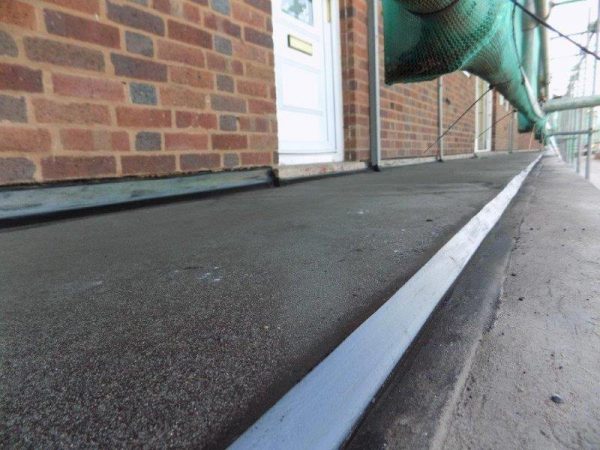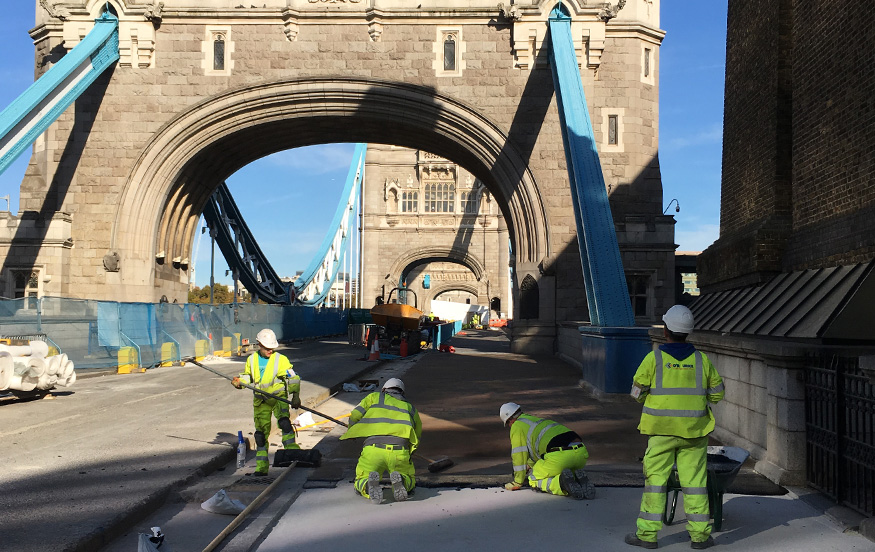With the fire rating of waterproofing systems under increasing scrutiny since the Grenfell fire disaster, it is becoming increasingly important for specifiers and building owners to consider the fire classification of waterproofing systems.
The Mastic Asphalt Council (MAC) has recently tested its Recreation Duty (RD) Grade Mastic Asphalt system incorporating glass fibre tissue underlay to the European fire classification standard EN 13501-1. It successfully achieves a fire classification rating of Bfl-s1, confirming the product is flame-retardant with very limited smoke development.
MAC Director Malcolm Grinstead said: “At present it would seem few waterproofing systems have achieved the Bfl-s1 fire classification rating to the European Standard, and this confirms mastic asphalt is a great choice for specifiers who need to demonstrate excellent fire ratings for waterproofing products.”
Recreation Duty Mastic Asphalt is manufactured in the UK and is ideal for use on roofs, access walkways, balconies, terraces, podiums, plant rooms and stairways.
 Traditionally consisting of graded limestone aggregate bound together with bitumen, today’s mastic asphalt systems are now manufactured using advanced polymer modified formulations to ensure all the performance characteristics of traditional asphalt systems, with the added benefits of increased flexibility, enhanced handling and sustainability. The incorporation of modern polymers into mastic asphalt systems has helped lead to its resurgence in the construction industry.
Traditionally consisting of graded limestone aggregate bound together with bitumen, today’s mastic asphalt systems are now manufactured using advanced polymer modified formulations to ensure all the performance characteristics of traditional asphalt systems, with the added benefits of increased flexibility, enhanced handling and sustainability. The incorporation of modern polymers into mastic asphalt systems has helped lead to its resurgence in the construction industry.
For specifiers and contractors seeking an efficient, cost-effective and simple to install way to weatherproof the exposed parts of buildings, mastic asphalt is a proven, long-lasting surfacing material. Seamless, durable and with exceptional waterproofing characteristics, mastic asphalt can be installed with minimal disruption and downtime.
As mastic asphalt is laid in molten form, it is often confused with other types of waterproofing membrane that require naked flame or torch on application. However, for major projects, the material is usually taken to site by hot charge tankers direct from the manufacturer to the point where it is needed for rapid installation – a major advantage for contracts with critical time constraints.
For smaller projects solid blocks are preheated in boilers placed at ground level. At no time is there any type of naked flame at the point of installation and because mastic asphalt is so highly flame resistant, there is little or no potential of fire risk.
Mastic asphalt is one of the few construction activities still regarded as a ‘craft trade’ and there are many time-served mastic asphalt roofing applicators working across the country. The skilled work involves ensuring that asphalt is at the correct temperature, and then spreading it using traditional techniques to coat the surface. A thermoplastic material that changes shape when heated, mastic asphalt cures to form a hard, durable, finished product to suit all applications of mastic asphalt.
Mastic asphalt is so durable over long periods that it is considered by many construction professionals to have little or minimal impact on the environment. At the end of its useful life, mastic asphalt is 100% recyclable or can be used in mastic asphalt screeds, etc., making it the ideal environmentally friendly option.
Mastic asphalt is carbon neutral and over 10 years ago the mastic asphalt sector became the first industry in the world to achieve the CarbonZero standard. It reduces carbon emissions and its seamless nature means it can be easily spot repaired, eliminating the need for costly wholesale replacement. The flowing characteristics of mastic asphalt make it easy for installing contractors to tackle surfaces which are complex, stepped or with multiple protrusions.
This article featured within the October 2021 edition of RCi Magazine – click here to view the article.

